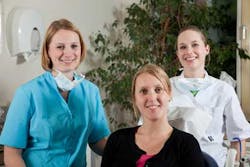by Helen H. Cohen, MA, CEG
Dentists in private practice are always very focused on the dental wellness of their patients, but what about the healthy functioning of your dental staff? Have you often felt like you were alone in managing and communicating to your team what you’d like to see happen for your practice?Do you ever feel like you are putting forth the most effort of everyone to accomplish your goals? It doesn’t have to be this way. Determining the “health” of your team and diagnosing what the problems are requires some analysis. To ascertain this valuable information, a simplified assessment can be done. If you are willing to put forth the effort to find out, please answer the following 10 questions as objectively as possible. Be as honest as you can. If you are able to easily answer each question quickly, then you are clear-minded about what weaknesses or strengths currently exist. If you find yourself struggling with a question, that means you may be in denial or avoiding the acknowledgment of the issues attached to that particular concern. It may be difficult and uncomfortable to scrutinize your own office’s dysfunctional areas. The validation of what is optimally working for your team is a great acknowledgment you should be proud of. The goal in doing this brief analysis is to shed light on what areas may require more immediate attention.Dental Team Disease Symptoms 1. Does your dental team use whispers and closed door meetings as a frequent form of communication?2. Is tension and conflict present most of the time? If so, can it be resolved without intervention from management?
3. Are projects worked on separately or with little or no knowledge of other members’ participation?
4. Do you have to watch what you say around certain people?
5. Do you have little or no trust in your team members?
6. Do you find yourself blaming or feeling any frustration “because others are not doing ______?”
7. Do you feel there is little or no accountability for the commitments that are made by others?
8. Do you find yourself often engaged in discussing or wondering “what if” scenarios?
9. Do you notice any office rumor mills occurring regularly and leading to false evidence that supports the expressed opinion or complaint?
10. Do you often feel a potential refusal or fear of asking for help?Dental Team DiagnosisIf you were able to be completely honest, you have revealed your team’s present state of health or disease. (Just like you do daily for your patients!)Based on how many of the 10 questions you answered yes to, score the results as follows: 0 - 1 Congratulations! You are a member of a functional dental team.
2 - 4 Well done! You are a member of a functional dental team.
5 - 7 Get help quickly! You are a member of a dysfunctional dental team.
8 -10 Get help now! You are a member of a very dysfunctional dental team.How your practice scored will determine the areas you need to concentrate on to alleviate the problems. When you have identified which topics need the most immediate treatment, schedule a meeting to openly discuss these areas with key staff members.To effectively accomplish this, you must first create a safe space for the team to be honest with each other and with you. Set some ground rules at the onset regarding treating each other with respect and not placing blame or judgment on others. Acknowledge that changes need to be made for the benefit of the entire team’s well-being. Consider bringing in an objective facilitator (a dental coach) to help define clear strategies and to redirect the energy and focus in a positive way. With the help of a facilitator, you and your staff can be held accountable to take productive action and create tangible results. Together with your team, you will be empowered to create a plan to eliminate the negative issues that are having an impact on how well your team functions. As a suggestion, should you wish to have some feedback from your staff on these concerns, anonymously have each member fill out the “Dental Team Disease Symptoms” evaluation. After you read their responses, you will be able to clearly ascertain the acknowledged obstacles. Each identified issue can serve to be future springboard topics for regular, ongoing staff meetings. Your dental team will always be the best asset of your practice. What better return on your investment is there than to improve and build on what you already have? The benefit is that you will probably be both less stressed and frustrated by proactively working on your practice’s health now and not letting things continue to malfunction. Think of this process like a patient’s routine preventative maintenance appointment. As the leader of your dental team, it is up to you to lead the way and to share in the vision, growth, and further development of your team. For the ultimate success of your practice, the best possible outcome is to help team members reach their highest potential as a healthy functioning unit.
Are you ready to take your practice to the next level? Helen H Cohen, MA, is a Life Coach who specializes in dental business coaching and consulting She invites you to experience a complimentary (no charge or obligation) 30-minute coaching session to see if you are ready and would benefit from dental coaching. Please visit her Web site at www.e3coaching.net to learn more about the services she provides. Contact Cohen at [email protected] or call her at (913) 491-1368. Her LinkedIn address is www.linkedin.com/in/helenhcohen.








